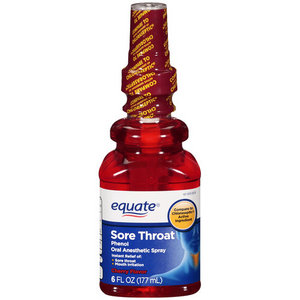
Gargling salt water can help reduce swelling and irritation in your throat. If something cold sounds better, have a glass of ice water. Sip on something warm, like chicken broth or a mug of your favorite tea. Liquids help clear out mucous membranes and can soothe throat irritation. Have a sore throat and looking for relief at home? The 5 remedies listed below might help. However, in some cases of GERD, a sore throat may be the only symptom. Additional symptoms might include heartburn, hoarseness, an acid taste in the mouth, a lump in the throat, and regurgitation. With this disorder, stomach acid backs up into the esophagus. Gastroesophageal reflux disease, or GERD, is a digestive system disorder. Exposure to tobacco smoke, whether through smoking or second-hand smoke, can not only irritate the throat, but also increases the risk of cancers of the mouth, throat, and voice box. There are a variety of irritants that can lead to regular sore throats and pain, such as cigarette smoke and alcohol. It can lead to severe pain along with difficulty swallowing and breathing. EpiglottitisĮpiglottitis is inflammation of the flap of tissue at the back of your throat. Regularly breathing through your mouth-due to chronic nasal congestion, for example-can also cause a dry sore throat. Dry air and nasal congestionīreathing in dry air can make your throat feel scratchy. Allergies can also lead to postnasal drip, which further irritates the throat. If you’re sensitive to things like mold, dust, pollen, and pet dander, you might notice a prolonged sore throat when your allergies flare up. A day or two later, a mild, dry cough may develop. In the earliest stage of whooping cough, the infection typically begins with a sore throat. It spreads through contaminated droplets in the air or through close contact with an infected person. Whooping cough, or pertussis, is an infection caused by a bacterium. Other kinds of bacterial infections can trigger inflammation of the tonsils (tonsillitis) and inflammation of the adenoids (adenoiditis)-both of which can lead to throat pain. Some people may experience stomach pain, nausea, vomiting, headache, or-in some cases-a rash known as scarlet fever. Although a strep throat infection tends to be mild, it can result in uncomfortable symptoms.īesides a sore throat, other strep throat symptoms include pain when swallowing fever red and swollen tonsils tiny, red spots on the roof of the mouth and swollen lymph nodes in the front of the neck. Streptococcus pyogenes, which causes a strep throat infection, is the most common. Several bacterial infections can cause a sore throat, as well. (You can test for HIV from the privacy of home with the Everlywell at-home HIV Test.) Bacterial infections When it isn’t treated, HIV can ultimately compromise the body’s immune system function, leading to acquired immunodeficiency syndrome (AIDS)-so consider getting tested if you are experiencing early signs of HIV.

In people who are HIV-positive, a fungal infection known as oral thrush can also cause a prolonged sore throat.

Infection with HIV can cause a sore throat, as well as other flu-like symptoms like fever, chills, muscle aches, fatigue, and an " HIV rash" (“HIV” stands for human immunodeficiency virus). Additionally, the Centers for Disease Control and Prevention (CDC) notes that a sore throat is a possible symptom of COVID-19, the disease caused by the novel coronavirus SARS-CoV-2.

These infections include the common cold, flu (or influenza), mono (or mononucleosis), measles, chickenpox, and croup. Viral infections are frequently responsible for sore throats. If your sore throat is caused by an infection, other symptoms may include: Signs an infection might be causing a sore throat White spots or pus around or on the tonsils.In general, however, a sore throat may be accompanied by: Symptoms can vary depending on the cause of the sore throat. Here, we’ll highlight symptoms related to a sore throat, some possible causes of a sore throat, home remedies, information regarding medical attention, and more-so read on. However, there may be cause for concern if you’ve had a persistent sore throat and are wondering “Why is my throat sore all the time?” Sore throats are relatively common and often subside on their own. To give you technically accurate, evidence-based information, content published on the Everlywell blog is reviewed by credentialed professionals with expertise in medical and bioscience fields. Medically reviewed by Neka Miller, PhD on July 10, 2020.


 0 kommentar(er)
0 kommentar(er)
